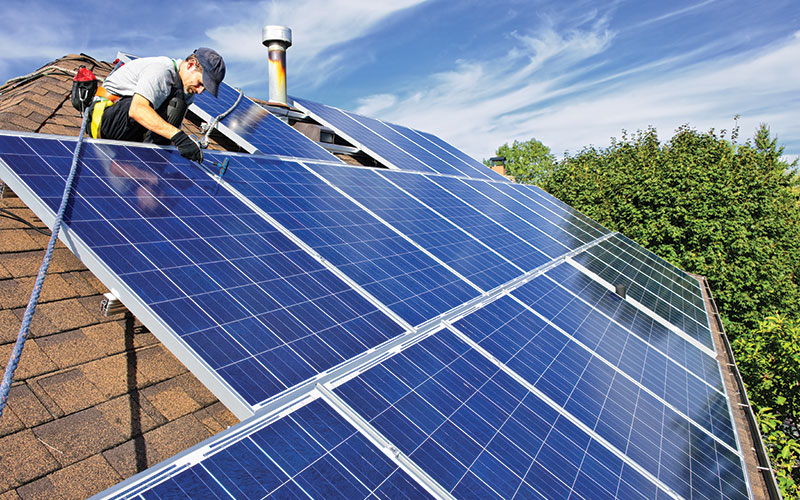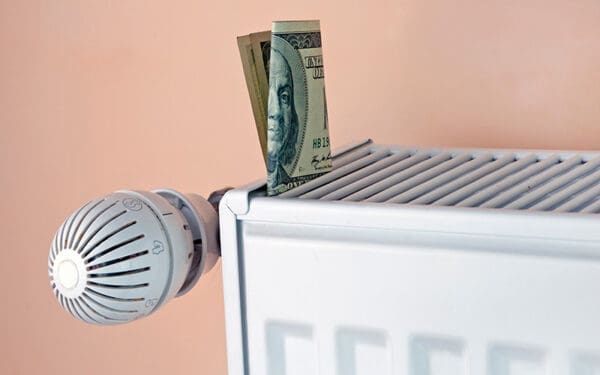
LePage's veto hurts the burgeoning solar industry in Maine. Photo credit: Shutterstock.
One of Governor LePage’s first official acts was to erect a sign on the New Hampshire border of the Maine Turnpike proclaiming that Maine is “OPEN FOR BUSINESS.” Unfortunately, LePage has not lived up to that promise.
His most recent veto of legislation designed to undo damage to the solar industry in Maine while enhancing access to solar power is most decidedly bad for business – and bad for consumers. The solar sector has been one of the fastest-growing industries in Maine (it’s also among the fastest growing in New England). But LePage’s anti-renewable energy stance has threatened the good jobs, economic growth, financial security, and energy independence that solar power offers. Instead, Maine’s current solar policy increases the level of uncertainty for both businesses and homeowners and discourages investment in this burgeoning industry.
Maine Takes One Step Forward, Two Steps Back on Solar
To recap, over the past few months, both houses of Maine’s legislature passed a bill that would have done two important things to move the state forward on solar:
- It would have prohibited utilities from being able to charge Maine families and businesses with solar panels for the electricity that they produce and use themselves. This would have involved installing costly extra metering equipment on the homes of people with solar panels – costs that would have been borne by all electricity customers.
- It would have increased access to solar for everyone – including those who can’t afford panels themselves or who don’t own land – by allowing more people to participate in community or group solar projects.
The bill had strong bi-partisan support in both houses. And yet, Governor LePage predictably vetoed it. He hypocritically allowed his anti-solar, anti-renewables hardline to prevail over his “Open for Business” message. (Unfortunately, we’ve seen this before, as described here last year).
LePage’s veto left it up to Maine’s legislators to move this legislation forward. To override LePage’s veto, they needed a two-thirds majority vote in both houses. The bill had initially passed in both the Senate and the House with enough votes to overcome a veto, so it should have been smooth sailing. Democrats – as well as House and Senate Republicans willing to stand up for their constituents in the face of pressure from LePage loyalists – did all that they could to keep their peers from kowtowing to the Governor and flip-flopping their votes.
But in the end, the promises of cleaner air, lower costs, energy autonomy, and economic development just weren’t enough for the LePage crowd. After seven different rounds of voting, the veto override failed.
It’s Now Up to Mainers to Fight for Clean Energy
So what’s next? First and foremost, it is up to Mainers to hold their representatives in the legislature accountable! If you’re proud of your representative for standing firm, let them know. If you’re disappointed, be sure you get the word out – and don’t forget to vote in November. Let’s show our leaders that Mainers demand more renewable energy by showing up at the ballot box.
For now, like we’ve seen on the national scale, the issue rests with the courts. CLF’s legal challenge in the Maine Supreme Judicial Court to the rules enacted by LePage’s Public Utilities Commission – the rules that were the subject of this defeated solar bill –remains pending (learn more about the rule at issue here).
We argued back in December that Mainers shouldn’t have to pay Central Maine Power or Emera Maine for electricity that is generated by a family’s or a business’s solar panels and never even touches the poles and wires of those monopolies. We expect a decision from the Court later this Spring.
Once you’ve reached out to your legislators, stay tuned for further updates on the progress of solar power in Maine. And if you want to learn more about why we need solar energy now, check out this video.



